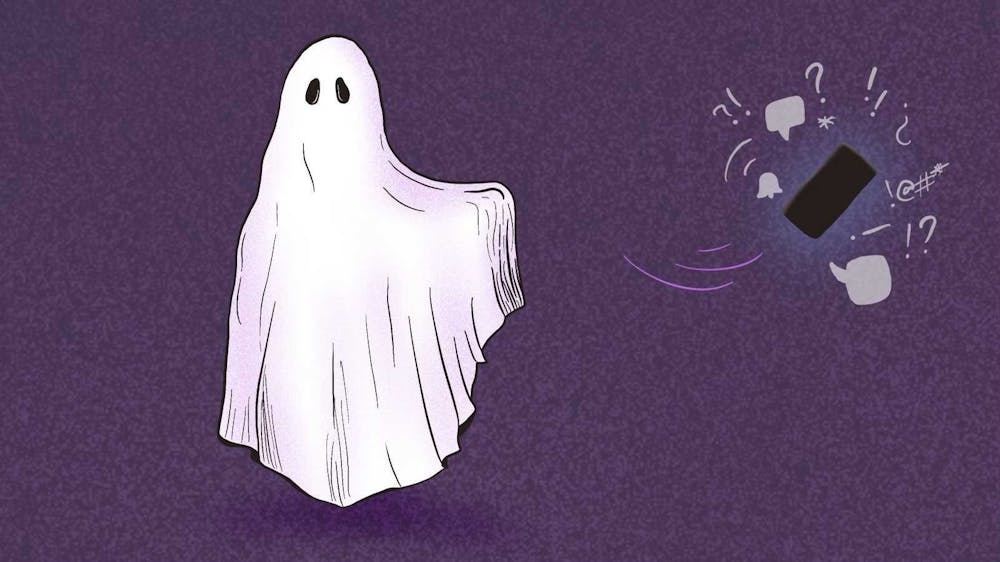We all know the vibe. We’re in our room, anxiously pacing in circles, restlessly tapping our phones every few seconds to see if a certain someone messaged us back.
It’s been a few days and perhaps they should’ve responded by now. But, we continue waiting for a text that never arrives, painfully reminded of the fact that, yes, once again we’ve been ghosted.
Ghosting, or “abruptly cutting off contact with someone without giving that person any warning or explanation for doing so,” is a modern colloquialism coined specifically for dating in the internet age. Ghosting doesn’t just apply to dating. Friends, colleagues or potential employers can suddenly stop responding — and we’re powerless to stop it.
According to a Health.com article, people often ghost to avoid confrontation and hurt the ‘ghostee’. Ghosters also engage in this practice out of convenience, a negative interaction, loss of interest, relationship state (how close you are with the person) or safety.
Though I’m no stranger to being ghosted — or to ghosting on one or two occasions to avoid further awkward communication — the worst, most embarrassing instance of ghosting happened to me merely a month ago.
I did my due diligence in finding a new therapist, as I’d moved past my old one and was in pursuit of further assistance. I called about 15 offices claiming to accept new patients and only two replied. I made my appointment, drove the 40 minutes to my initial consultation and agreed to work with her going forward.
Naturally, I made a follow-up appointment.
I again drove the 40 minutes to her office two weeks later, stressing out because I wouldn’t be the minimum 10 minutes early that my anxiety demands. Nevertheless, I arrived with five minutes to spare.
I waited. I waited for 45 minutes, but nobody entered the waiting room. I checked my calendar and confirmation text to ensure my appointment was indeed that day. It was.
But she never responded, so I went home.
The dreaded realization came like a tidal wave: my new therapist completely ghosted me. You haven’t hit rock bottom until even your therapist doesn’t want to talk to you. She did eventually message me back two weeks later, but the damage had already been done. I declined further appointments.
Thankfully, I’m not down bad enough for this to send me completely over the edge but can you imagine if I was?
The normalization attributed to ghosting has real life implications. It can make others feel disrespected, used and disposable — and these feelings are only compounded by how long we’ve known the person, according to Psychology Today.
This social rejection is so painful because it activates the same pathways in the brain as physical pain and can leave the same kind of physical and psychological damage — particularly to a person’s self-esteem. Knowing self-esteem is a personal interpretation of other people’s perceptions of you, ghosting as a form of rejection leaves the injured party uncertain of where they went wrong and without closure to appropriately move on.
Although ghosting is a woefully unfair and undeserved proposition, it’s important to acknowledge that, should a person ghost you, it has much more to do with the perpetrator than yourself. The onus lies entirely on the person inappropriately ending a relationship than it ever had to do with the relationship to begin with. The only way to rebuke such exploitation of your vulnerability is to do everything in your power to move past it.
Gili Freedman, St. Mary’s College of Maryland assistant professor of psychology, said in the New York Times being honest and upfront about your intentions can help avoid awkward miscommunication as a relationship progresses.
Entering friendships and relationships with an open mind and low expectations can also help avoid disappointment should something turn out differently than you had hoped.
Overall, it’s important to employ a heavy dose of perspective and empathy when dealing not only with other people’s feelings, but also your own. No, we shouldn’t ghost others if we can avoid it, but, should it happen to you, forgiving that person and accepting it exclusively as their loss can help you move forward.
Natalie Gabor (she/her) is a senior studying journalism with minors in business marketing and philosophy. She hopes to one day find a career that tops her brief stint as a Vans employee.






